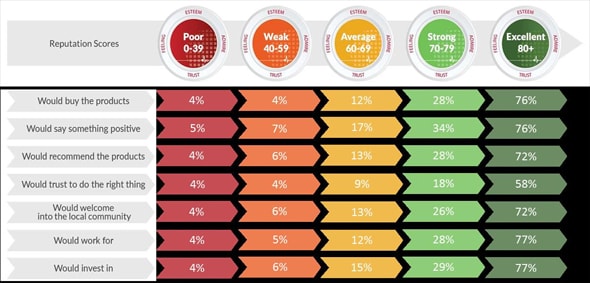The fact that a company’s reputation is key for it to succeed is bread and butter for PR professionals. And a recent study backs up just how much value a reputation adds to a company. Results from this year’s UK RepTrak study, from the research and advisory firm Reputation Institute, shows how strong the correlation is between a company’s reputation and consumer willingness to recommend and buy products and services. For those with excellent reputations, 76% of consumers say they would definitely buy their products, compared with just 4% of consumers who would do the same for companies with poor reputations.
The top 10 companies which are all perceived as having an “excellent” reputation, are:
- Lego Group
- IKEA
- BMW Group
- Sony
- Rolls-Royce Aerospace
- Aston Martin
- Rolex
- Samsung
- Bosch
- Kellogg’s

Ed Coke, director of consulting services at the Reputation Institute, defines exactly what exactly a “good” reputation looks like: “A great starting point is to define reputation as the emotional bond that companies have with stakeholders, built upon the level of trust, admiration, respect and good feeling stakeholders have towards a company.”
How PROs can improve a company’s reputation
Discussing how PROs can help to build reputations, Coke says that companies need to convince stakeholders that they are delivering on the specific expectations people have in areas such as product quality, responsible business behaviour, financial performance and workplace environment. Coke adds: “Strikingly, between 52% and 68% of consumers are uncertain as to what even the 250 most visible companies are doing across the seven rational dimensions of reputation (products/services, innovation, workplace, governance, citizenship, leadership, and performance). These stakeholders are ‘fence-sitters’ who can swing either positively towards or negatively away from supporting a company, based on what they know through direct interactions, the company’s own communications and, critically, what others say. Those that are able to communicate and engage across the seven dimensions via a clear and compelling articulation of their company story can see a massive improvement in recommendations and willingness to buy.”
Coke says that to win the trust and support of consumers and other stakeholders, you need to be relevant in a local context. “It’s not enough to have a strong and appealing product brand; you need to be seen as a company who cares about the people in the local market.
“People are looking for companies to be active partners in solving their issues; this requires local investments, strong and authentic communications, and the willingness to think long term to build the relationships needed to win trust and support. You can’t just look at your export market as just another sales office; you have to engage with the people in the country and show your face as a company and not via a product campaign alone.
“Adopting a data-driven approach based on these principles will make the seemingly intangible a real and managed reputation metric. And as we all know, what gets measured, gets done.”
Background
The Reputation Institute used its RepTrak model to analyse the reputations of companies and institutions. The RepTrak system measures a company’s ability to deliver on stakeholder expectations on seven key rational dimensions of reputation: products and services, innovation, workplace, governance, citizenship, leadership and performance.
Companies are ranked on a score from 0-100 based on their overall reputation, and are grouped as Excellent (80+), Strong (70-79), Average (60-69), Weak (40-59) or Poor (Below 40).
PR Masterclass: The Intersection of PR and GEO
Join PRmoment for a Masterclass featuring 10 of the industry’s foremost experts. You will walk away with a clear, actionable strategy for adapting your content to an AI-first search environment.
Taking place on Wednesday 25th February in London, both virtual and in person tickets are available.
Early bird ticket sale ends Friday 9 January.
PR MasterclassIf you enjoyed this article, sign up for free to our twice weekly editorial alert.
We have six email alerts in total - covering ESG, internal comms, PR jobs and events. Enter your email address below to find out more:









